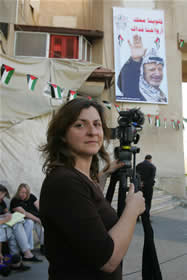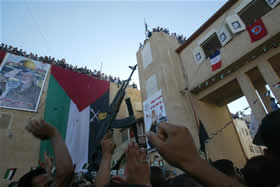A Feature Documentary by Sherine Salama
An interview with Sherine Salama Palestinian-Australian Filmmaker
 Shohreh Jandaghian– How did you first get involved in filmmaking, Sherine?
Shohreh Jandaghian– How did you first get involved in filmmaking, Sherine?
Sherine Salama – Documentary film making for me has always been the perfect vehicle to express how I see the world. After travelling for many years I spent several years in Cairo, where I became interested in journalism. I wrote for English language newspapers and travelled to Jerusalem for the first time during the Gulf War in 1991. When I came back to Australia I worked as a television reporter, which was a great experience, but I got tired of not being able to tell the stories I wanted to tell, in the way I wanted to tell them. I wanted to immerse myself in the lives of my characters and develop relationships with them. My first film, “Australia Has No Winter”, was an observational documentary that followed a family of refugees from the former Yugoslavia who settled in Melbourne. Their anxiety and dislocation very closely mirrored my own family’s experience when we moved to Australia from Egypt. The public response to the film was overwhelming, and its success gave me the opportunity to make “A Wedding in Ramallah”.
Shohreh – “The last days of Yasser Arafat” will be shown in this year’s edition of AFI Fest in the special section of World Cinema. How did you come about this idea to make a documentary about Yasser Arafat?
Sherine – I feel as though the idea found me, rather than the other way around. I’ve never had a thing for men in uniforms, and I’m not by nature a very political person – I’m usually much more interested in the struggle of ordinary people than in leaders. But I literally woke up one morning in August 2003, convinced that Arafat was going to die, and soon. When I searched the Internet I couldn’t find any references to documentaries about him, and I felt a kind of duty to make a film about him before he died. Only a few weeks later Ehud Olmert, then the deputy Prime Minister, threatened to assassinate or expel Arafat, and I knew I had to follow my instincts.
Shohreh – Under which circumstances could you arrange this interview with Yasser Arafat?
Sherine – Anyone who’s seen the film would know that the circumstances weren’t very favourable! At first I thought that my Palestinian background would help me. But for a long time it didn’t seem to get me anywhere. For weeks I turned up at the compound every time the media was allowed in, ingratiating myself with Arafat’s advisers, and relentlessly lobbying anyone I knew who had a connection with him, no matter how slight. Eventually I realised that his minders would never give anyone an outright “no” because they didn’t want to be seen to refuse an interview request. They just left it up to the journalist to run out of patience. I think they were surprised that I didn’t. It’s possible that in the end I wore them down. But I think it was my meeting with Arafat’s former adviser and old friend, Bassam Abu Sharif that finally tipped the scales in my favour.
Shohreh– Is this film for you a political film or a personal one?
Sherine – Inevitable it’s a bit of both. It’s political because it records the events leading up to the death of a key political figure of the 20th century. And it becomes political, for some people, because it humanises rather than demonises Arafat. But I think my emphasis on his personal qualities, on his extraordinary relationship with his people, and on my own journey to get the interview, make it a very personal film.
Shohreh– Is there something about Yasser Arafat in his last days, which is not shown in the film?
Sherine – I doubt there is any footage of Arafat when he was ill apart from the video of him smiling, in his pyjamas, which was released to reassure people that he was OK. In terms of my interview, what you see in the film is what I got. Arafat was a political machine, and I’m not sure that he was ever prone to bouts of introspection.
Shohreh– You have shot the film in October 2004, what made it take so long to finish it?
Sherine – I finished filming in November 2004, and the film was finished in May, 2006, so it took me 18 months. I always find it’s a bit of a battle to get a film finished – sometimes it can be every bit as stressful as the shoot, even when that was in a war zone! In this case there was a bit of a delay while I raised the additional funding I needed to make a feature-length film.
Shohreh– What reaction have you received from critics and audiences?
Sherine –The general response from critics and audiences has been mainly positive. Many people are very moved by the scenes leading up to Arafat’s death, and many are surprised to see a much more human side to him than they had been expecting.
 Shohreh– Has the film shown in Palestine?
Shohreh– Has the film shown in Palestine?
Sherine – No, it hasn’t screened in Palestine yet, but I’m hoping to be there when it does. There is a lot of nostalgia there for Arafat now, he was seen as such a unifying force, and it will be interesting to see how people respond to the film.
Shohreh– Is there any point you would like to stress concerning the film?
Sherine – Just that I never set out to really assess Arafat’s legacy. I know that everyone will bring their own baggage to any film about Arafat, but that never interested me. I didn’t make this film because I wanted to tell the world how great or how terrible Arafat was. More than anything I was curious – I was fascinated by the drama of his plight. He was like an old king trapped in the ruins of his castle, yet still defiant. I wondered how it would all end.
Shohreh– What is your forthcoming project?
Sherine – I’m really keen to make a film about music in the Middle East! Something that looks at how Arabic culture is expressed through song, and how certain singers have become touchstones for millions of people.
Shohreh– I wish you Good Luck Sherine at AFI Fest 2006.
Sherine – Thank you!

